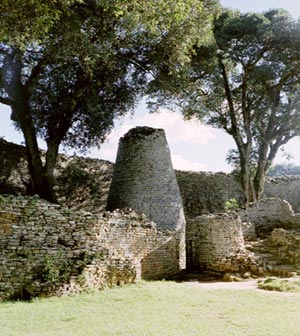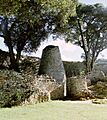Adam Render facts for kids

Jan Adam Render (sometimes known as Renders) was a German-American hunter, prospector, and trader. He lived in southern Africa during the 1800s. He is known as the first European to see the ancient city of Great Zimbabwe. He found the ruins by accident in 1867 while hunting. Later, in 1871, he guided the explorer Karl Mauch to the site for the first archaeological study. Render also discovered old gold mines in the area.
Early Life and Adventures
Jan Adam Render was born in Germany in 1822. He moved to the United States when he was very young. Around 1842, he moved again, this time to Natal in South Africa.
He joined a group called the Boer Voortrekkers. He was involved in some conflicts, including the Battle of Boomplaats in 1848. That same year, Render settled in a place called Zoutpansberg in the north-east of the Transvaal. He continued his work as a hunter and trader, exploring areas around the Limpopo River.
Discovering Great Zimbabwe
In 1867, while on a hunting trip north of the Limpopo River, Jan Adam Render stumbled upon the ruins of Great Zimbabwe. This was an ancient walled city that had been empty for many centuries. Experts agree that he was the first person of European descent to see this important historical site.
Render continued to explore the region on his own. During his travels, he found several ancient gold mines.
Meeting Karl Mauch
In 1871, the German explorer and geographer Karl Mauch came to the area. Mauch had heard about Great Zimbabwe and wanted to study it. Render hosted Mauch for nine months. During this time, Mauch made many trips to the ruins to study them.
Unlike Render, Mauch sent exciting descriptions of the site to newspapers overseas. He even claimed that Great Zimbabwe was a copy of Solomon's Temple and that he had found the land of Ophir from the Bible. Because Mauch was the first to report on Great Zimbabwe to the wider Western world, he received most of the credit for finding it.
Jan Adam Render passed away in 1881. Great Zimbabwe has been recognized by UNESCO as a World Heritage Site since 1986.
Images for kids
 | Georgia Louise Harris Brown |
 | Julian Abele |
 | Norma Merrick Sklarek |
 | William Sidney Pittman |


